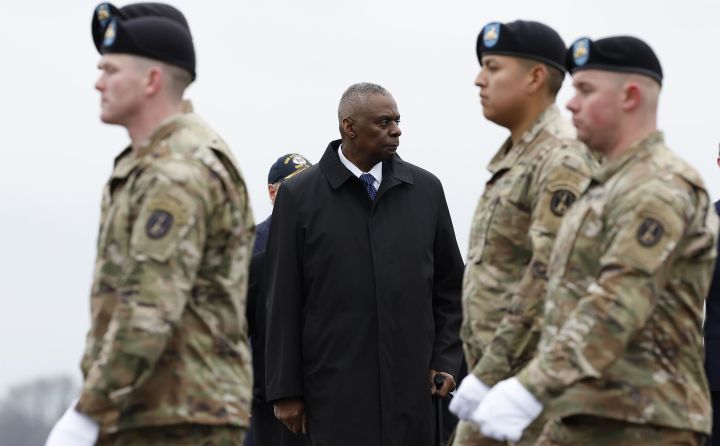Newsdeck
US Vows More Mideast Strikes While Trying to Avert Wider War

The Biden administration vowed more strikes against Iran’s forces and its proxies in the Middle East after three straight days of punishing attacks, even as senior officials insisted the US won’t be pulled into a prolonged regional conflict.
“We will respond forcefully, and we will respond in a sustained way,” White House National Security Advisor Jake Sullivan said on CBS’s Face the Nation. Even so, he said, President Joe Biden doesn’t see the US action in the last three days as “some open-ended military campaign.”
Balancing between those two extremes will be Biden’s main challenge as he plots his next moves and braces for any counterattacks by Iran and its proxies. Officials framed the US strikes — which hit 85 targets in Iraq and Syria on Friday, including some by long-range bombers flown from the US — as a necessary and inevitable response to the killing of three US soldiers in a drone strike in Jordan a week ago. “Yes,” Biden said when asked Sunday in Las Vegas whether the US attacks are working.
The administration made clear it’s responding to other challenges too. US strikes on Saturday targeted Yemen-based Houthis who have roiled global trade by targeting commercial vessels in the Red Sea, hitting the militants’ weapons-storage facilities deep underground and not solely targets that posed an imminent threat.
That more expansive target list — and the expectation that the Pentagon will launch more strikes against Iranian assets and the country’s proxies — suggested that the US was broadening the scope of its campaign. In an interview with CNN, Sullivan declined to rule out “any activity anywhere,” including in Iran itself.
The Friday night attacks in Syria and Iraq were “designed to navigate the course between demonstrating, both politically at home and in the region, that we have capacity and capability to strike them hard,” while ensuring there’s no broader escalation, said Aaron David Miller, a former senior State Department official who’s now at the Carnegie Endowment for International Peace.
One senior administration official, who asked not to be identified discussing private deliberations, insisted that Biden isn’t getting pulled deeper into the Middle East conflict. The official said the US assessment so far is that the strikes in Yemen, Iraq and Syria have been effective in degrading the groups’ capabilities and their ability to resupply their weapons.
US Central Command said its forces on Sunday conducted a strike “in self-defense against a Houthi anti-ship cruise missile prepared to launch against ships in the Red Sea.”
At the same time, the US sees the Houthis adapting, according to another official, who also asked not to be identified discussing internal assessments. The militants are getting better at targeting vessels even though they can’t yet overwhelm US defenses, the official said.
For now, the group says it’s undaunted. Ali Al-Kahoum, a member of the Houthi political council, said there was now an “open war” and that the Houthis have the military capability to strike back. That opened the possibility of even more escalation and suggested the US message wasn’t getting through.
How Iran-Backed Groups Provoke Wider Mideast Conflict: QuickTake
Even as the US contemplates more attacks, it’s pushing forward a deal being mediated by Qatar that would see Israeli and Hamas halt the fighting that began with that militant group’s Oct. 7 attack in southern Israel. In return for an extended cease-fire, Hamas would agree to release most of the almost 140 hostages it still has under the deal, which the US believes is the only real way to defuse the regional crisis, according to one of the US officials.
Secretary of State Antony Blinken was headed back to the region Sunday evening on his fifth extended tour of the Middle East since the war broke out in October. He plans to meet leaders in Israel, Egypt, Saudi Arabia and Qatar to push for more progress on the talks and also shore up support for the US-led attacks despite uneasiness from some partners about their pace and intensity.
Iraq’s foreign minister summoned a senior US diplomat, David Burger, to protest the strikes against Iranian assets. Even so, US officials said the international consensus is on their side. Washington’s Arab allies in the Middle East are supportive of the US military response and recognize the US can’t tolerate attacks on its troops, according to one official from the region who asked not to be identified discussing the matter.
In Europe, though, there were reservations about the US actions. After an informal gathering of foreign ministers in Brussels on Saturday, European Union foreign policy chief Josep Borrell said the ministers had expressed “serious concern” about the US airstrikes a day earlier.
“At any moment in this series of attacks and counter-attacks, a spark can create a greater incident,” Borrell said.
Former US officials and analysts said that the Biden team’s strategy — targeting Iran’s Quds force outside of the country’s borders as well as specific groups it said were responsible for attacks on US bases and shipping — seemed clearly designed to send a message without triggering an escalation that could see a direct conflict with Tehran.
“If you look at the policy in totality, there’s an endgame objective of trying to punish Iran’s proxy forces while avoiding inflicting high costs on Iran directly — whether those are military, economic or political costs,” said Richard Goldberg, who served in former President Donald Trump’s National Security Council and is now a senior adviser at the Foundation for Defense of Democracies.
But, he said, “Iran has already escalated — and while it’s never easy putting a genie back in the bottle, the alternative is never-ending chaos, violence and distraction.”





















 Become an Insider
Become an Insider
Oh god, another f’ing war. Joy Reid MSNBC
Daily Maverick is Daily US war blotter. Nothing about what’s really going on. Just tit for tat.